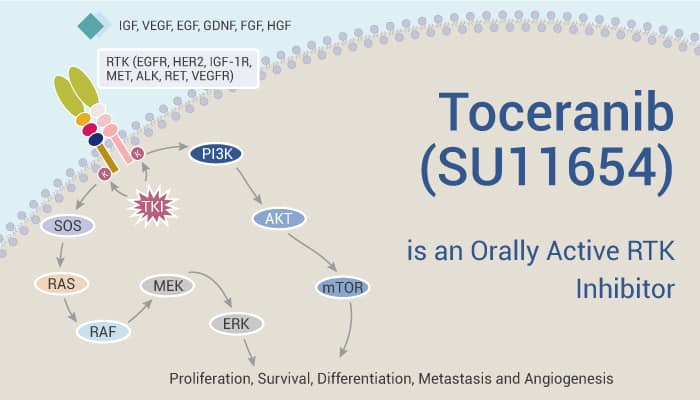Toceranib is an orally active receptor tyrosine kinase (RTK) inhibitor. Besides, Toceranib inhibits PDGFR, VEGFR, and Kit with Kis of 5 and 6 nM for PDGFRβ and Flk-1/KDR, respectively. What’s more, Toceranib has antitumor and antiangiogenic activity and has the potential to recurrent, non-resectable grades 2 and 3 canines MCTs.
Toceranib is a selective inhibitor of the tyrosine kinase activity of several members of the split kinase RTK family, including PDGFR and Flk-1/KDR. Recently, research shows that Toceranib inhibits the growth of parental C2 cells in a dose-dependent manner with an IC50 of <10 nM. Besides, Toceranib inhibits KIT phosphorylation in a dose-dependent manner. In contrast, TR1, TR2, and TR3 sublines are resistant to inhibition by Toceranib with IC50 of >1,000 nM. Moreover, Toceranib shows morphologic differences for parental C2 cells. In contrast, Toceranib-induced morphologic differences are not identified in the resistant sublines. Additionally, chronic TOC exposure results in c-kit mRNA and KIT protein overexpression in the TOC-resistant sublines.
Toceranib shows antitumor and antiangiogenic activity.

Toceranib (2.5 mg/kg; p.o.; once every other day for 2 weeks) significantly decreases the number and percentage of Treg in the peripheral blood of dogs with cancer. Moreover, Dogs receiving Toceranib and cyclophosphamide (CYC) (oral CYC was added at 15 mg/m(2)daily) demonstrate a significant increase in serum concentrations of IFN-γ, which is inversely correlated with Treg numbers after 6 weeks of combination treatment.
In conclusion, Toceranib is a selective and orally active inhibitor of receptor tyrosine kinase (RTK). Besides, Toceranib shows antitumor and antiangiogenic activity. Moreover, Toceranib has the potential for the research of canine mast cell tumors.
Reference:
[1] London CA, et al. Clin Cancer Res. 2003 Jul;9(7):2755-68.
[2] Halsey CH, et al. BMC Vet Res. 2014 May 6;10:105.
[3] Mitchell L, et al. J Vet Intern Med. 2012 Mar-Apr;26(2):355-62.